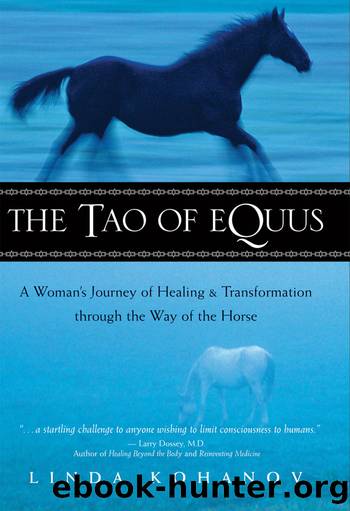The Tao of Equus by Linda Kohanov

Author:Linda Kohanov
Language: eng
Format: epub
ISBN: 9781577318071
Publisher: New World Library
THE TAO OF EFFECTIVE LEADERSHIP
In many ways, itâs encouraging, even remarkable, that men like Tom Dorrance, Ray Hunt, and Monty Roberts emerged from the rough and tumble world of bucking broncos and branding irons to promote a more humane approach to horse training. Roberts, however, admits that he lost his faith in dominance techniques when he was beaten into submission by his father, a wrangler from the old school whose violent methods of starting young horses had much in common with how he related to young Monty. In The Man Who Listens to Horses, Roberts candidly discusses how his childhood difficulties partially inspired his ability to work from the horseâs perspective and follow equine body language cues. In negotiating the elder Robertsâs aggressive, uncompromising attitudes, Monty and the colts that came to his fatherâs ranch were in the same predicament. Roberts later observed that women more easily adapt to the methods presented at his clinics, a phenomenon heâs not quite sure how to explain. Yet a pattern emerges in comparing his childhood oppression with the mixed messages and prejudices women throughout history have confronted: Revelations and innovations come more readily to those who are betrayed or invalidated. Even women raised in idyllic circumstances tend to orient less toward wielding absolute control over others and more toward skills associated with relationship. Some tough and dominant female trainers have, however, made names for themselves in competitive riding, mostly because thatâs what they thought it would take to gain the respect of people attracted to this sometimes cutthroat subculture.
In reality, the most humane methods espoused by both male and female trainers stem from rekindling a relationship with nature based on collaboration and sensitivity rather than fear and intimidation. Consciously or unconsciously, they develop qualities associated with what Taoist philosophers characterize as yin, or feminine, styles of leadership to balance the yang, or masculine, qualities emphasized in the human world. Like the ancient Taoists, these trainers look to the horses themselves as teachers and try to align with their natural abilities and behaviors.
Rather than dominating or disregarding nature, as most philosophies and religions attempt to do, Taoism recognizes that the primordial well-spring of existence expresses itself through nature. You donât have to be a practicing Taoist to appreciate these insights or put them to use in the riding arena. From a Judeo-Christian perspective, the Tao is not a synonym for God. It is more specifically a description of the way God works through nature, a term that describes the unfolding of creation. In this sense, Taoism is not an exclusive religion, but a system of thought that emphasizes aligning oneself with the flow of natureâs currents as the most effective path to a long, healthy, peaceful life.
Early Chinese sages discovered the Tao through introspective meditation and silent observation of nature. Lao-tzu, who may have been an actual historical figure or merely the pen name for a group of anonymous sages, wrote the most famous work on this subject approximately five hundred years before the birth of Christ.
Download
This site does not store any files on its server. We only index and link to content provided by other sites. Please contact the content providers to delete copyright contents if any and email us, we'll remove relevant links or contents immediately.
Finding Gobi by Dion Leonard(2834)
Grumpy Cat by Grumpy Cat(2736)
A New Earth: Awakening to Your Life's Purpose by Eckhart Tolle(2640)
The Silkworm by Robert Galbraith(2485)
Tippi by Tippi Hedren(2225)
End of Days by Sylvia Browne(2175)
Total Cat Mojo by Jackson Galaxy(1998)
Backyard Chickens Beyond the Basics by Pam Freeman(1938)
Penguin Bloom by Cameron Bloom(1928)
The Animals Among Us by John Bradshaw(1858)
The Ultimate Pet Health Guide by Gary Richter(1754)
All Things Bright and Beautiful by James Herriot(1742)
The Plant-Based Dog Food Revolution by Mimi Kirk(1704)
Vet in Harness by James Herriot(1696)
Doggy Desserts: 125 Homemade Treats for Happy, Healthy Dogs by Cheryl Gianfrancesco(1678)
Dog Years by Mark Doty(1672)
Cesar's Way by Cesar Millan(1666)
Chicken Soup for the Ocean Lover's Soul by Jack Canfield(1635)
Animal Speak by Ted Andrews(1616)
